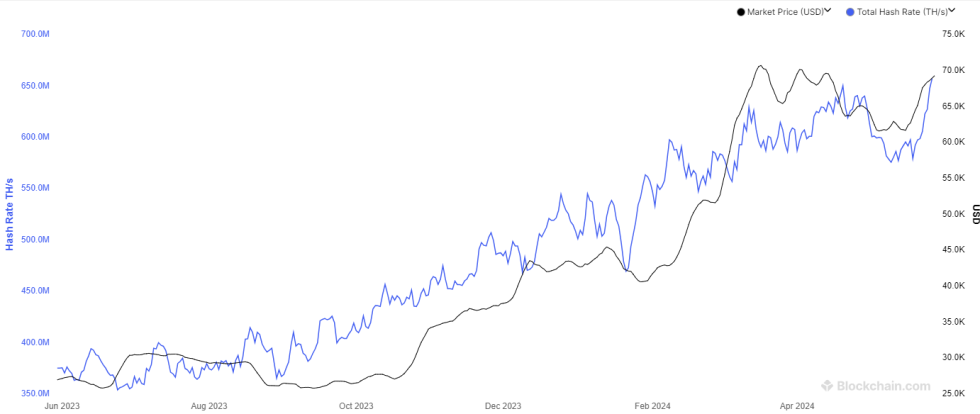ARTICLE AD BOX
On-chain data shows the Bitcoin mining hashrate has sharply rebounded from its post-Halving lows and has achieved a new all-time high (ATH).
7-Day Average Bitcoin Mining Hashrate Has Just Set A New ATH
The Bitcoin network runs on a consensus mechanism known as the “proof-of-work” (PoW). In this system, validators called miners compete with each other using computing power to get the chance to add the next block to the blockchain.
The “mining hashrate” refers to a measure of the total computing power the miners have currently connected to the network for this purpose.
When the value of this metric goes up, it means that either exiting miners are expanding their facilities or new miners are joining the chain. Such a trend implies these validators are finding the network attractive right now.
On the other hand, the indicator trending down suggests some mines have decided to disconnect from the network, potentially because they are finding the chain unprofitable to mine on.
Now, here is a chart that shows the trend in the 7-day average Bitcoin mining hashrate over the past year:

As displayed in the above graph, the 7-day average Bitcoin mining hashrate had started declining after setting a new ATH last month. The drawdown had intensified in the first couple of weeks of this month, taking the metric down to notably lower levels.
This sharp downward trajectory in the indicator is due to a major event on the network last month: the fourth Halving. Halvings are periodic events that occur every four years and permanently slash the BTC block rewards in half.
The block rewards miners receive for solving blocks on the network are one of the two main components of their revenue. The other part of their income, the transaction fees, has historically been quite low compared to the block rewards, so the latter has essentially been their main earning source.
As such, it’s not surprising that some of the miners living in zones with high electricity prices and using inefficient mining rigs would disconnect as the economic effects of the Halving set in.
But then one question arises: if there had already been three Halving events in the asset’s history before this one, how did the hashrate keep growing to new highs if the miner revenue continuously got squeezed?
Two factors explain this. The first is that mining rigs have become more efficient over the years, allowing miners to host more power while consuming less energy.
The other and perhaps the more important one is that the coin’s price has been on the up overall in its history. While block rewards remain fixed in BTC value until the Halving rolls around, their USD value still naturally fluctuates with the spot price.
Time and time again, the growth in the price has helped offset revenue loss for miners arising from the halvings. Recently, the price has shown some recovery, and as is visible in the hashrate chart, the metric has also bounced back alongside it.
It would appear that the miners have been satisfied enough with this revenue boost from the rally that they have taken their computing power to a brand new ATH.
BTC Price
At the time of writing, Bitcoin is trading at around $68,000, down more than 3% over the past week.
.png)
 7 months ago
2
7 months ago
2








 English (US)
English (US)